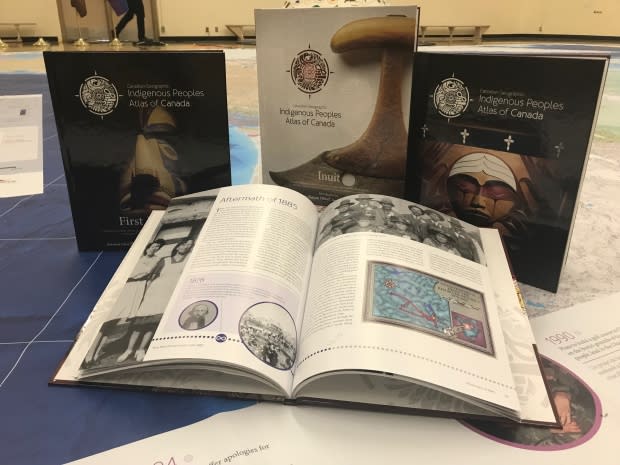New Indigenous atlas will be in every junior high and high school in Alberta
Every junior high and high school in Alberta is receiving a copy of the new Canadian Geographic Indigenous Peoples Atlas of Canada.
The atlas is being touted as a comprehensive education tool written from the perspective of Inuit, and Indigenous and Métis citizens.
Published last year, the atlas is separated into four books, each covering a single broad topic including the history, contributions and territories of Inuit, First Nations and Métis people.
"I grew up in Fort Chipewyan … and I didn't learn much about [my history]," said Marlene Poitras, Alberta regional chief for the Assembly of First Nations.
Poitras spoke at the announcement Friday at Ben Calf Robe School in Edmonton.
"It was only when I went to post-secondary and into nursing that I started learning [more]," Poitras said to a room full of students, gathered in the elementary and junior high school building.
"That was very important for me to understand. In school, I didn't get that information."
The province is distributing 1,600 of the atlas sets, one copy for each junior high and high school in Alberta. A free online version is available for home-school students and anyone else seeking the information.
When asked whether one copy per school is enough to serve the entire student body, Alberta Education Minister David Eggen said the government is planting the seed for future projects.

"This is just to give it a bit of a taste," said Eggen. "It might provide the beginning of a collection to First Nations, Métis and Inuit literature."
"It's part of our commitment to building a strong curriculum for learning about our Indigenous past that we all share."
Taking responsibility for 'ugly' past
The atlas dives into detail about Canada's residential schools and the lasting effects on Indigenous people today.
Charlene Bearhead was the education adviser on the project. She said the Royal Canadian Geographical Society heard from more than 200 Indigenous sources to create the books.
Richard Feehan, Alberta's minister of Indigenous relations, said the books clearly lay out Canada's "ugly" past.
"These documents tell some truth," said Feehan.
"It's extremely important that we don't gloss over the ugliness that has happened in this country. Instead we address it, we take responsibility for it, and we live a commitment to make sure that this doesn't happen again."
In addition to the atlas, schools also have access to massive floor maps showing Indigenous territories and treaty areas.
Vital content
Ben Calf Robe social studies teacher Brad Anderson said the maps are one of the most valuable resources within the new atlases.
"Having the maps is going to be an awesome way to [shed] a new light on Canada," Anderson said.
"Just being able to see new borders and see how Indigenous people settled this land prior to contact is going to change a lot of people's perspectives on Indigenous culture.
"This is going to be vital for any teacher, Indigenous or non-Indigenous," he said. "Knowing that the community has accepted [the atlas] and this is their book, I know this is going to change how we use it in the classroom."
Students at the announcement Friday rushed onto the map, huddling around parts of Alberta and pointing out where their families are historically from.
It's extremely important that we don't gloss over the ugliness that has happened in this country. Instead we address it, we take responsibility for it. - Richard Feehan, Alberta minister of Indigenous relations
"I think it's cool that we're able to do that now instead of having to search it up," Grade 7 student Nadia Bigstone said.
"It has a lot of reserves and settlements and lots of places you don't see on a normal map in classes."
Poitras said the sense of history is vital for young people growing up in Canada. She's hopeful the new education tools will bring non-Indigenous and Indigenous kids closer together.
"The youth today are so open and they don't have all of these stereotypes," she said. "If they learn about our history when they're young, they're going to grow up having more understanding and better relations.
"That's very important, for society as a whole and humanity, that we all work together for the betterment of our society."


